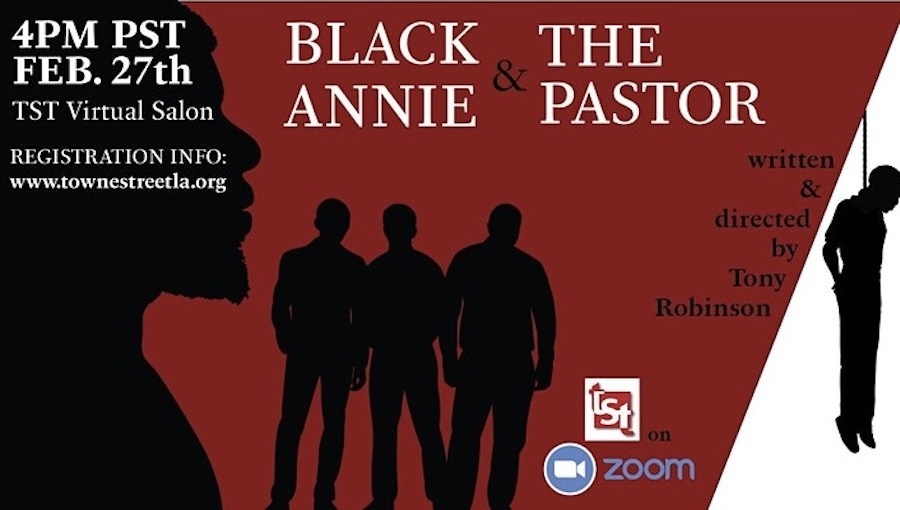The following is an interview with writer/director Tony Robinson regarding the upcoming launch of Black Annie and the Pastor in coordination with Towne Street Theatre on Sunday, February 27th. In this interview, Fanbase Press Editor-in-Chief Barbra Dillon chats with Robinson about the creative process of bringing the production to life virtually, how the story may connect with readers, and more!
Barbra Dillon, Fanbase Press Editor-in-Chief: You will soon be streaming a one-night-only online production of Black Annie and the Pastor. What can you share with us about the premise of the show and the inspiration behind its genesis?
Tony Robinson: The premise of the show is about a primarily black Muncie Indiana neighborhood taking a stance in the face of an egregious injustice and the Ku Klux Klan’s threat to desecrate the corpses of two young African American men in 1930. The boys were lynched by a mob of ten to fifteen thousand white people about forty miles away in the town of Marion. The play also looks at the symbiosis between the black and white communities in Depression-era Muncie, Indiana.
When I was very young, my family would come to Muncie to visit my paternal grandmother. I would hear them speak about this incident in hushed tones, but I was too young for it to resonate fully in my child’s mind. Fast forward six decades. I was visiting with a friend who mentioned Shaffer Chapel which triggered something in my memory banks. He proceeded to recount a version of the story which seemed just a bit off-center to me. At the end of his tale he said, “You should write a play about it”
I resisted the idea until I was going through my parents’ library at home and found the book, A Time of Terror, by James Cameron. He was the boy who survived the mob and wrote this book abut the ordeal. That was it. My friend and I proceeded to interview the descendants of some the people who wee directly involved with what I consider to be very heroic act. Let me stress this play is not about the lynching. Personally, I have heard enough lynching stories to last me for the remainder of whatever time I have in this life. No, this play is about what the late Paul Harvey used to call, “The rest of the story.” On that note I will add that the photograph of that lynching was the inspiration for the song, “Strange Fruit,” by Billie Holiday.
BD: What can you tell us about the creative process of staging a performance to be streamed for audiences via Zoom, and what was your experience in collaborating with the cast and crew as both the director and the writer?
TR: As a writer I keep rearranging the alphabet until I get a story, I believe is worth telling with words actors want to speak. As a director the challenge is guiding those actors in presenting their best performances inside the teeny tiny proscenium of a Zoom window. There were the technical challenges that go along with any kind of streaming project, cameras, lighting etc.
Like anything else in theater, it is a collaborative effort. Towne Street is the most amazing organization you can imagine. I am privileged to work with an extraordinary team. There is a spirit of collectiveness that in my experience is unequaled in bringing stories to life. From the producers to the actors and technicians, everybody throws themselves full bore into the production. This has been the heart and soul of Towne Street since its inception by Nancy Cheryll Davis-Bellamy, Nancy Rene, and Nathaniel Bellamy. I am so grateful to be a part of this remarkable group of artists.
BD: There will also be a live talkback with the team following the show. What can audiences anticipate in terms of this supplemental experience?
TR: What can the audience anticipate during the Q&A? Fun. TST audiences are very intelligent. It has been my experience that they present great questions and insights which ofttimes makes for some lively discussions. It is always exciting to see the play with fresh sets of eyes from people with diverse backgrounds. My firm belief is that show sells itself on the car ride home. Three different people can often see three different plays.
BD: At Fanbase Press, our #StoriesMatter initiative endeavors to highlight the impact that stories can have on audiences of various mediums. How do you feel that Black Annie and the Pastor will connect with and impact audiences?
TR: I feel that in the American society Black people don’t seem to exist until there is a tragic event. Then, we are seen through the lens of that circumstance. An example of this is the friend who suggested that I write this play was white, he passed away recently, in his telling of the events he spoke in way that made it seem like the people of the Whitely neighborhood lived in a state of docile dormancy until they were awakened by a Paul Revere-like person sounded a clarion call to action.
That perception bothered me a lot. After all, my grandmother lived in that neighborhood, so I understood the people there didn’t just pop up out of nowhere or just sit around passively waiting for some catastrophe to validate their existence. They led full rich lives. So, I wanted to create a world that is less two-dimensional portraiture and more verbally holographic of that community at that time.
BD: Lastly, what would you like to tell readers who want to learn more about and purchase tickets for Black Annie and the Pastor?
TR: I must confess that because Towne Street has such great marketing team, I usually stay out of their way. That being said, tickets are available here.

